Welcome to Issue 9 of Non-native Species News: Summer 2023
Thank you to everyone who has contributed to this newsletter. All links in this newsletter are external and a pdf version is available.
News
Updated assessment of costs of Invasive Non-native Species to the UK published
The Centre for Agriculture and Bioscience International (CABI) with Defra funding has published An updated assessment of the direct costs of invasive non-native species to the United Kingdom in the Biological Invasion Journal and in the Defra science website.
Asian hornet nest destruction
On Thursday 22nd June a small primary nest of Asian hornets was reported to the National Bee Unit (NBU). A National Bee Unit Inspector investigated the report and collected samples which have been sent for analysis by scientists. Traps have been set for hornets returning to the nest site and follow up activities will take place to raise awareness.
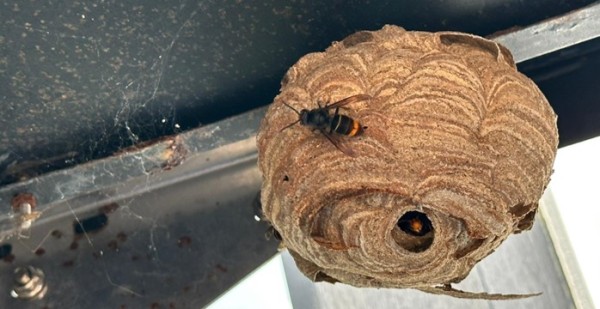
Image: Vespa velutina primary nest with insects (photo: Desmond Lee via BeeBase)
This is the earliest date in the season that a nest has ever been found in Great Britain. Nests have previously been reported in the autumn when insects are more visible as the population of the nest increases to its maximum.
Please report sightings of Vespa velutina using the ‘Asian hornet Watch’ app for iPhone and Android, or the online reporting form. Free ID sheets and alert posters are available to order from the NNSS.
NNS Inspectorate
The Non-native Species Inspectorate has been expanded to ten staff, covering GB. Contact the Inspectorate.
Training Coordination Group
A working group has been established to improve INNS training provision in GB and is collating details of existing training courses and providers. If your organisation provides INNS training for staff or others, or uses the current NNSS e-learning, please contact the NNSS.
GB Stakeholder Forum
The 19th GB Stakeholder Forum was held at the Venue Cymru, Llandudno on the 21st June. Over 80 participants joined a day of talks and workshops on topics including island biosecurity, meeting global targets, INNS research, developing a pet pathway action plan, delivering the evidence strategic plan and more. Proceedings from the workshop will be available shortly. The Forum followed the British Ecological Society (BES) Invasion Science Special Interest Group meeting the previous day. Find out more about the BES event below.
Communications: Check Clean Dry border biosecurity campaign
This summer we are reminding recreational water users (particularly anglers, boaters, and paddlers) to Check Clean Dry their boat, clothing and equipment after leaving the water to prevent the spread of invasive aquatic species, particularly if they have been abroad.
Posters are on display at Dover, Plymouth, Hull, Harwich, Holyhead, Fishguard, and Pembroke dock, and in onboard magazines on ferries departing from Portsmouth, Poole and Plymouth. Further adverts have been placed in angling and boating magazines, on their websites, social media and emails to mailing lists. All activities in England have been funded by a group of nine water companies, through the Aquatic Biosecurity Partnership. Posters in Wales were arranged by Welsh Government and Natural Resources Wales.
Please help us to promote the campaign over the summer, landscape and square graphics are available for social media. View all awareness raising materials available from the NNSS:
- Check Clean Dry
- Be Plant Wise (including kits for garden centres and other plant retailers, and guides to gardening without invasive non-native species)
- ID sheets for over 60 non-native species
- 5 things you can do to help
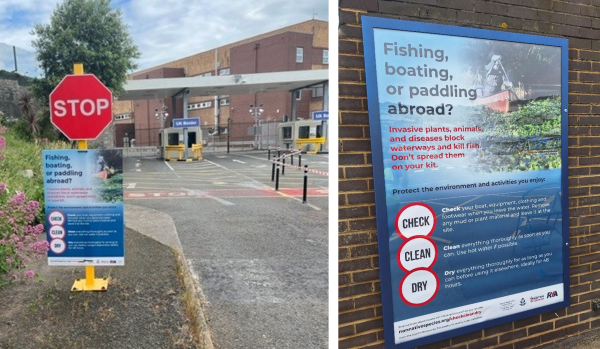
Image: Border biosecurity posters in place at the UK border in Plymouth and Dover ports
Updates from non-native species projects
SISI end of project conference
Callum Sinclair, SISI
The years have rather flashed by but we are coming towards the end of the first phase of the Scottish Invasive Species Initiative (2017 to 2023) funded by National Lottery Heritage Fund and NatureScot. To both mark and celebrate that milestone and look ahead to what happens next with our new Nature Restoration Fund award we are holding our end of project conference on Wednesday 06 September in Aviemore.
We’d love to have as many people as possible join us in Aviemore where we will be sharing what we have achieved across a range of our project activities. The detail of the programme is still a work in progress – but we intend to include presentations from others involved in invasive non-native species management as well as what we’ve been getting up to. So, whilst we work on the programme we thought we’d share the date and allow people to make an early booking to come along.
View the booking form with return instructions. Please return the completed booking form to sisi@nature.scot
Tees Rivers Trust INNS trip to Estonia
Chloe Lawrence, Tees Rivers Trust
During the start of June, Tees Rivers Trust went on a venture to Estonia to meet up with some amazing people from the Environmental Board. Not only seeing some of their conservation projects such as bog restoration and ancient woodlands, but also to see some of their invasive species’ projects and how they currently manage them.
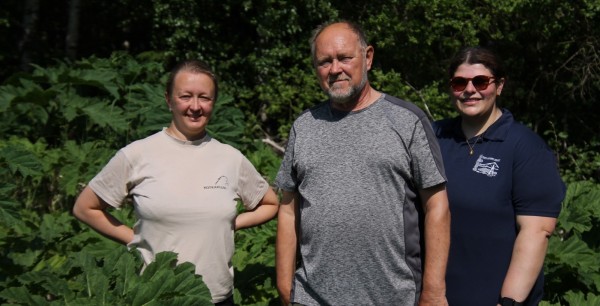
Image: John and Chloe from Tees Rivers Trust (centre and right) on a field visit in Estonia to learn about alternative methods for managing giant hogweed.
Many species which are invasive to Estonia are species we also have in the Tees Catchment (and the rest of the UK), bringing the same environmental problems (giant hogweed, Himalayan balsam, Japanese knotweed, American signal crayfish etc).
Management is very different, with finances being provided by the government and the European regional development fund. The work is carried out by contractors rather than volunteers (this is mainly the case for giant hogweed), who dig out the plants opposed to using chemicals which are not allowed to be used in conservation areas or near watercourses.
One alternative method for managing INNS that they are currently trialling has been to use geo-textile material which blocks out light preventing growth. This is still very early stages but seems promising so far, and something which would be good to trial along the Tees in the future.
For more information about the visit, please email: Chloe@teesriverstrust.org.
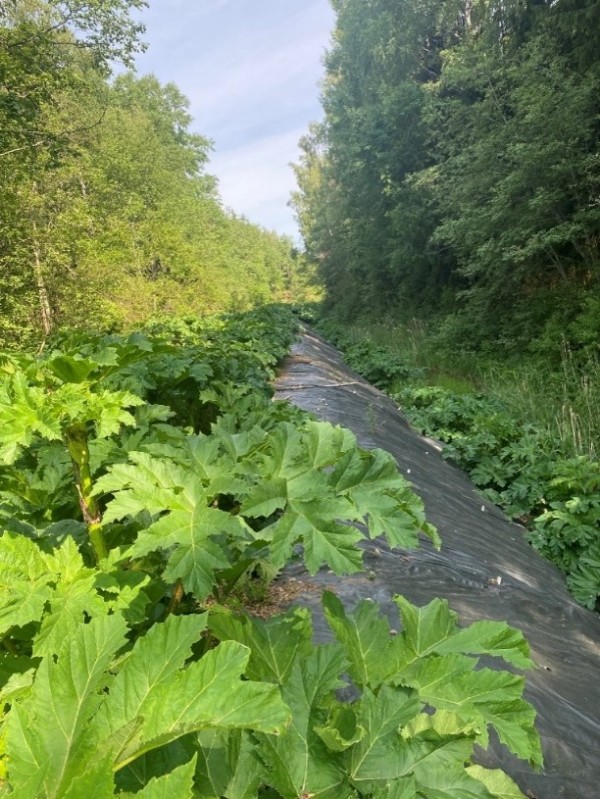
Image: A trial site testing the use of geo-textile material to prevent giant hogweed growth by blocking light.
BES Invasion Science Special Interest Group meeting
Steph Bradbeer, BES Invasion Science Special Interest Group / Yorkshire Water
The BES Invasion Science Special Interest Group (SIG) held an in-person meeting in Llandudno, North Wales in June 2023, to enhance the contribution of invasion science to policy and management. This event was supported by the Wales Ecological Resilience Network (WaREN) and APEM. Over 55 delegates attended, representing academia, government, local action groups, and private industry for a variety of activities:
- Keynote speakers Dr Emily Smith and Prof David Aldridge emphasised sector engagement throughout the research process and translating findings into practical outcomes.
- Lightning talks and posters excellently outlined their work in concise formats, demonstrating the echoing calls from the meeting for translation of research into ways that can be better understood by policy and management.
- An Early Career Panel Session highlighted diverse career routes in invasion science and opportunities for those starting out in their careers.
- An Evidence Strategic Plan Workshop captured suggestions to enhance invasive species management, emphasising increased research impact and understanding ongoing work.
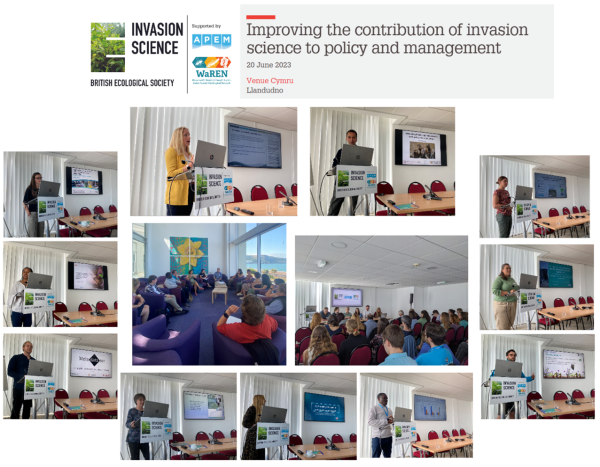
Image: Speakers at the meeting
The SIG aims to bridge gaps between sectors and support early career researchers, and encourage collaboration to address invasive species challenges. By working together, we can make a significant impact on ecological and economic consequences. Join the BES Invasion Science Special Interest Group Committee in driving invasion science's central role in policy, management, and conservation efforts.
Floating pennywort removal on the River Lea Navigation
Drew Chadwick, Angling Trust
The Thames Pilot Project to remove floating pennywort, led by The Angling Trust & British Canoeing, continues into London. Sunday 26th June was a very productive day with many volunteers enjoying the sun and contributing their time to make their local river more accessible for recreational use.
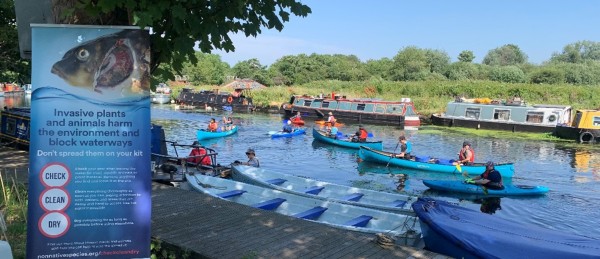
Image: Volunteer paddlers on the water helping to collect floating pennywort.
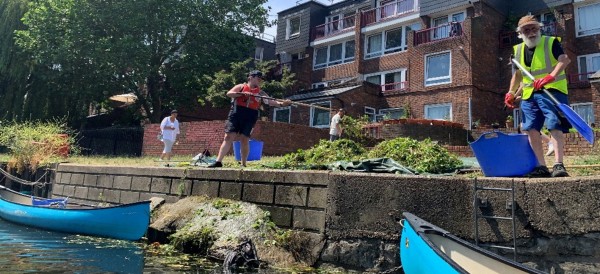
Image: Further volunteers on the bank removing floating pennywort from the water to be disposed of.
The fantastic volunteers removed over two tonnes of floating pennywort from the Lea Navigation. This is part of an ongoing project on the Lea navigation as well as other waterways across the UK, so please keep your eyes peeled on our social media pages where we will promote volunteering opportunities and are encouraging everyone to get involved with our inclusive events.
For further details of upcoming events please contact our Environment Officers:
- Ian Doyle (North): doyle@anglingtrust.net
- Drew Chadwick (South): chadwick@anglingtrust.net
Find out more about the GB Floating Pennywort Strategy.
Biosecurity at the Paracanoe and Under 23 National Championships
Richard Atkinson, British Canoeing
British Canoeing teamed up with the Yorkshire Wildlife Trust on 4th June 2023 to deliver washdown facilities at the National Water Sports Centre in Nottingham. Several clubs from around the country attended the Paracanoe and Under 23 National championships.
Alex Green (YWT) and Richard Atkinson (BC) washed down sprint boats at the end of the last day of races. Alex already has helped out at Sheffield Canoe Club at one of their events at Ougtibridge and another at Bradford and Bingley CC (a national slalom event)
Further biosecurity events are planned at Nottingham in July and Sept regatta meetings.
For further information, please contact Richard Atkinson at Richard.atkinson@britishcanoeing.org.uk or mobile 07808 640108
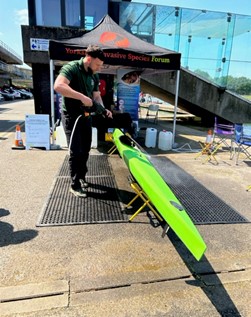
Image: Alex Green washing sprint boats at the end of the final day of races.
New biosecurity advice launched for ornamental aquatics industry
Pauline Davey, OATA
The Ornamental Aquatic Trade Association has launched a new risk assessment tool and guide to help businesses involved in the home aquarium and garden pond industry improve their biosecurity.
The trade association has revamped and improved its guidance document on biosecurity, making it an easier read with information on how to look at ways to stop the spread of disease and invasive species within businesses.
Accompanying the guide is a simple-to-use Risk Assessment Tool that enables businesses to examine their approach to biosecurity and get advice on areas that need improvement, which the new document will then help them to achieve.
“Our industry deals in a wide range of non-native species so we need to play our part in ensuring good biosecurity knowledge among businesses to help them operate to high standards,” explained OATA Chief Executive Dominic Whitmee.
The new tool and guide were launched during Invasive Species Week 2023 and can be found on OATA’s website.
Quick links
- The updated GB Invasive Non-native Species Strategy
- UK Biological Security Strategy launched
- Call for manuscripts for upcoming special issue of Journal of Zoological and Botanical gardens
- Catch up on Invasive Species Week webinars
Contact us
Contact us: nnss@apha.gov.uk.
We are always looking for updates from stakeholders for future newsletters. If you would like to submit an article for the Autumn 2023 issue (Oct) please get in touch.
For more information please visit www.nonnativespecies.org where you can find:
- The Non-native Species Information Portal (NNSIP) with detailed factsheets for over 300 non-native species and distribution data for over 3000 species
- ‘What can I do?’: links to our campaigns, training, and other guidance
- A gallery of non-native species images for education and awareness raising
- Non-native species legislation
- Information on Local Action Groups
- Biosecurity resources
- And much more!
You can also follow our awareness raising campaigns on Twitter @CheckCleanDryGB and @InvasiveSp.
